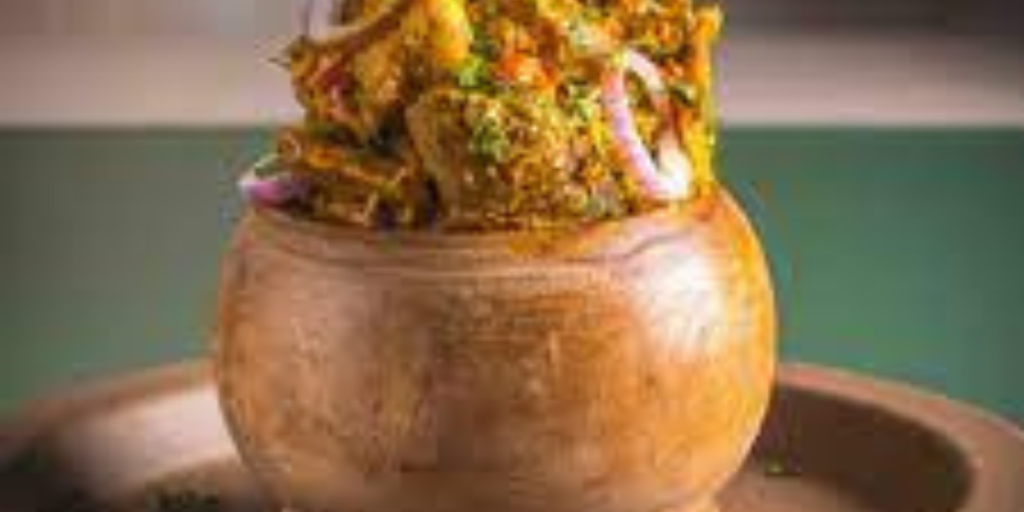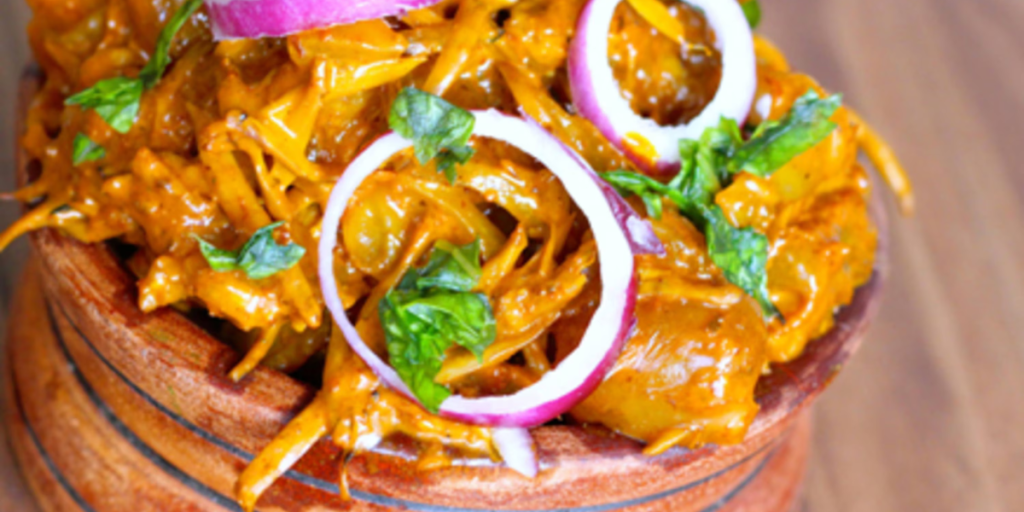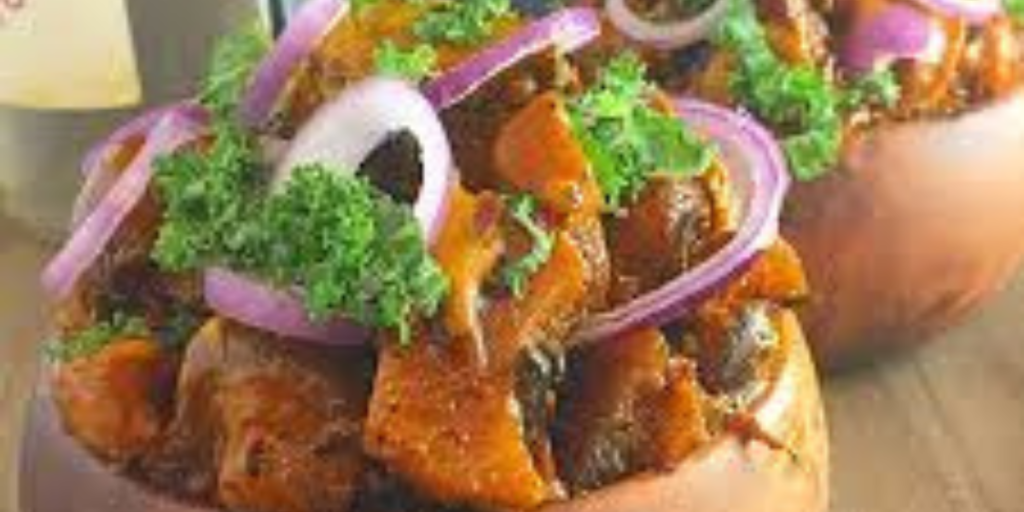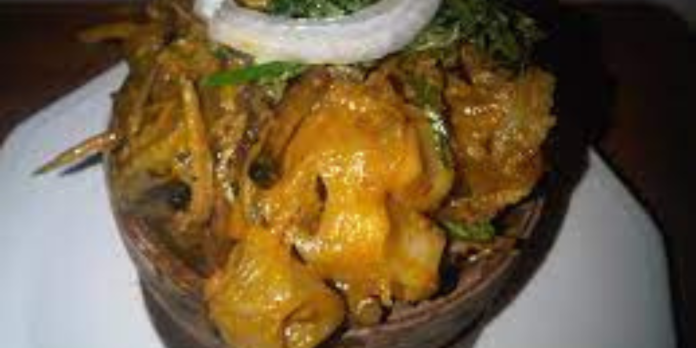Table of Contents

Nkwobi : Nigerian cuisine is a tapestry of rich flavors, vibrant colors, and diverse ingredients that reflect the country’s cultural heritage. Among the numerous traditional dishes, Nkwobi and Isi Ewu stand out as favorites, especially among the Igbo people of southeastern Nigeria. These dishes, though often confused, have distinct differences that make each unique. In this comprehensive blog post, we will delve into the differences between Nkwobi and Isi Ewu, exploring their origins, preparation methods, cultural significance, and more. By the end of this article, you will have a deeper appreciation for these iconic dishes and a clear understanding of what sets them apart.
Understanding Nigerian Cuisine
Nigerian cuisine is a celebration of the country’s rich cultural diversity, with each ethnic group contributing its unique flavors and cooking techniques. From the savory Jollof rice of the West to the spicy Afang soup of the South, Nigerian dishes are known for their bold flavors and hearty ingredients. Traditional meals are often enjoyed communally, reflecting the importance of family and community in Nigerian culture. Among these traditional dishes, Nkwobi and Isi Ewu hold a special place, particularly among the Igbo people.
What is Nkwobi?
It is a traditional Igbo delicacy made from cow feet. It is a spicy, rich dish typically enjoyed as a snack or appetizer. The preparation of Nkwobi involves boiling the cow feet until tender, then mixing them with a thick, spicy sauce made from palm oil, ground pepper, crayfish, and other local spices. The dish is often garnished with sliced onions and Utazi leaves, adding a fresh, slightly bitter flavor that complements the richness of the sauce. Nkwobi is a popular dish in Nigerian bars and restaurants, often enjoyed with cold beverages.
What is Isi Ewu?
Isi Ewu, which translates to “goat head,” is another beloved Igbo dish. As the name suggests, it is made from a goat’s head, which is carefully cooked and seasoned to create a flavorful, spicy dish. The preparation of Isi Ewu is more complex than Nkwobi, as it involves breaking down the goat head and removing inedible parts. The meat is then cooked and mixed with a spicy sauce similar to that, made from palm oil, pepper, crayfish, and traditional spices. Isi Ewu is often garnished with onions and Utazi leaves, and like Nkwobi, it is a popular choice in bars and restaurants.
Key Differences Between Nkwobi and Isi Ewu
Main Ingredients

The primary difference between Nkwobi and Isi Ewu lies in their main ingredients. It is made from cow feet, which are known for their gelatinous texture and rich flavor. Isi Ewu, on the other hand, is made from a goat’s head, which offers a different texture and taste profile. The goat meat in Isi Ewu is tender and flavorful, with a slightly gamey taste that distinguishes it from the milder cow feet used in Nkwobi.
Preparation Methods
While both dishes involve slow-cooking the meat and mixing it with a spicy sauce, the preparation methods differ in complexity. Nkwobi is relatively straightforward, involving the boiling of cow feet until tender. Isi Ewu, however, requires more skill and effort, as the goat head must be carefully broken down, and inedible parts removed before cooking. This added complexity makes Isi Ewu a more challenging dish to prepare.
Flavor Profiles
Nkwobi and Isi Ewu have distinct flavor profiles, despite the similarity in their sauces. It’s flavor is rich and slightly gelatinous, thanks to the collagen in cow feet. The spices in the sauce add heat and depth, while the Utazi leaves provide a refreshing contrast. Isi Ewu, with its goat meat base, has a bolder, more robust flavor. The meat’s natural gaminess is complemented by the spicy, savory sauce, creating a dish with a complex, layered taste.
Nkwobi 1 of The Best Nigerian Meals You Should Try.
Serving Styles
Traditionally, both Nkwobi and Isi Ewu are served in small, communal bowls, often garnished with sliced onions and Utazi leaves. However, there are regional variations in how these dishes are presented. In some areas, Nkwobi is served with a side of sliced, fresh vegetables, while Isi Ewu may be accompanied by a light, refreshing salad to balance its rich flavors. The serving styles reflect the cultural importance of these dishes as communal foods, meant to be shared and enjoyed with others.
Nutritional Profiles of Nkwobi and Isi Ewu

Understanding the nutritional profiles of Nkwobi and Isi Ewu can provide insights into their health benefits and dietary contributions.
Nkwobi
- Protein: Cow feet are a good source of protein, essential for muscle repair and growth.
- Collagen: High collagen content supports joint health and skin elasticity.
- Vitamins and Minerals: Contains essential vitamins and minerals like calcium, phosphorus, and iron.
- Fats: Palm oil in the sauce provides healthy fats, though it is calorie-dense and should be consumed in moderation.
Isi Ewu
- Protein: Goat meat is rich in protein, providing essential amino acids.
- Vitamins and Minerals: Goat meat offers a variety of vitamins and minerals, including B vitamins, zinc, and iron.
- Healthy Fats: Goat meat has a lower fat content compared to cow feet, with a favorable ratio of healthy fats.
- Spices: The spices used in Isi Ewu offer additional health benefits, such as anti-inflammatory properties.
Cultural Significance and Social Context
Both Nkwobi and Isi Ewu hold significant cultural importance in Igbo society. They are not just dishes but symbols of hospitality, tradition, and communal living.
How To make Semo Into Puff Puff in 2024 Best Recipe
Importance in Igbo Culture
In Igbo culture, food plays a central role in social gatherings and ceremonies. Nkwobi and Isi Ewu are often served at weddings, festivals, and family celebrations. They are seen as special dishes that bring people together, reflecting the values of community and shared experiences.
Role in Social Gatherings and Ceremonies
These dishes are particularly popular in social settings, such as bars and restaurants, where they are enjoyed as snacks or appetizers. Their rich flavors and communal serving styles make them ideal for sharing, fostering a sense of togetherness and conviviality.
Regional Variations and Interpretations
There are regional variations in how Nkwobi and Isi Ewu are prepared and served. These differences reflect the diverse culinary traditions within Nigeria and highlight the adaptability of these dishes to local tastes and preferences.
Best Puff Puff Recipe For 100 People
Culinary Techniques and Skills

Preparing Nkwobi and Isi Ewu requires specific culinary skills and techniques. Here are some tips and common mistakes to help you master these dishes.
Specific Culinary Skills Required
- For Nkwobi: Proper cleaning and boiling of cow feet, ensuring the meat is tender but not overcooked.
- For Isi Ewu: Skillful breakdown of the goat head, careful removal of inedible parts, and proper seasoning to enhance the meat’s natural flavors.
Tips for Home Cooks
- Nkwobi: Use fresh cow feet, cook slowly to ensure tenderness, and balance the spices for a rich, flavorful sauce.
- Isi Ewu: Source a fresh goat head, take your time in breaking it down, and marinate the meat for enhanced flavor.
Common Mistakes and How to Avoid Them
- Overcooking the Meat: Both dishes require slow cooking, but overcooking can lead to a loss of texture and flavor.
- Underseasoning the Sauce: The sauce is the heart of both dishes, so be generous with spices and seasonings to achieve the desired depth of flavor.
- Ignoring Presentation: Traditional garnishes like onions and Utazi leaves not only add flavor but also enhance the visual appeal of the dishes.
Puff Puff Recipe for 5kg Flour Best of 2024
Modern Takes and Fusion Recipes
As Nigerian cuisine gains international recognition, contemporary chefs are reinventing traditional dishes like Nkwobi and Isi Ewu.
How Contemporary Chefs Are Reinventing These Dishes
Chefs are experimenting with fusion recipes, combining traditional Nigerian elements with global culinary techniques. For example, Nkwobi tacos or Isi Ewu sliders offer a modern twist while preserving the essence of these dishes.
Fusion Recipes That Combine Traditional Elements with Modern Cuisine
- Nkwobi Tacos: Use tender cow feet in a spicy sauce, served in soft tortillas with fresh vegetables.
- Isi Ewu Sliders: Mini burgers made with goat meat, topped with spicy sauce and garnished with Utazi leaves.
- Nkwobi Pizza: A unique take on pizza with a topping of spicy Nkwobi and melted cheese.
How Nkwobi and Isi Ewu Are Being Introduced to International Audiences
International restaurants and food festivals are showcasing these dishes, introducing global audiences to the rich flavors and cultural significance of Nigerian cuisine. Cooking classes and culinary tours are also popularizing these traditional dishes beyond Nigeria.
Frequently Asked Questions (FAQs)
Common Questions About Nkwobi and Isi Ewu
- What is the difference between Nkwobi and Isi Ewu? Nkwobi is made from cow feet, while Isi Ewu is made from a goat’s head. Both dishes are cooked in a spicy sauce but have different textures and flavors.
- Can I make these dishes at home? Yes, with the right ingredients and preparation techniques, you can make Nkwobi and Isi Ewu at home. Follow traditional recipes or experiment with fusion variations.
- Are there any health benefits to these dishes? Both dishes offer health benefits, including high protein content, essential vitamins and minerals, and the benefits of spices used in their preparation. However, they are also high in calories, so moderation is key.
Misconceptions and Clarifications
- Misconception: Nkwobi and Isi Ewu are the same dish. Clarification: While they share similarities in preparation and spices, they are distinct dishes made from different main ingredients.
- Misconception: These dishes are too difficult to make at home. Clarification: With patience and practice, you can master the preparation of Nkwobi and Isi Ewu. Start with simple recipes and gradually improve your skills.
Chapter 10: Conclusion
Nkwobi and Isi Ewu are more than just delicious dishes; they are a testament to the rich culinary heritage of the Igbo people and Nigerian cuisine as a whole. By exploring their differences, understanding their preparation methods, and appreciating their cultural significance, we gain a deeper appreciation for these traditional foods. Whether you are a food enthusiast looking to expand your culinary horizons or someone with a deep connection to Nigerian culture, Nkwobi and Isi Ewu offer a flavorful journey into the heart of Igbo cuisine. So, the next time you enjoy these dishes, remember the rich history and cultural traditions they represent, and savor every bite.




















